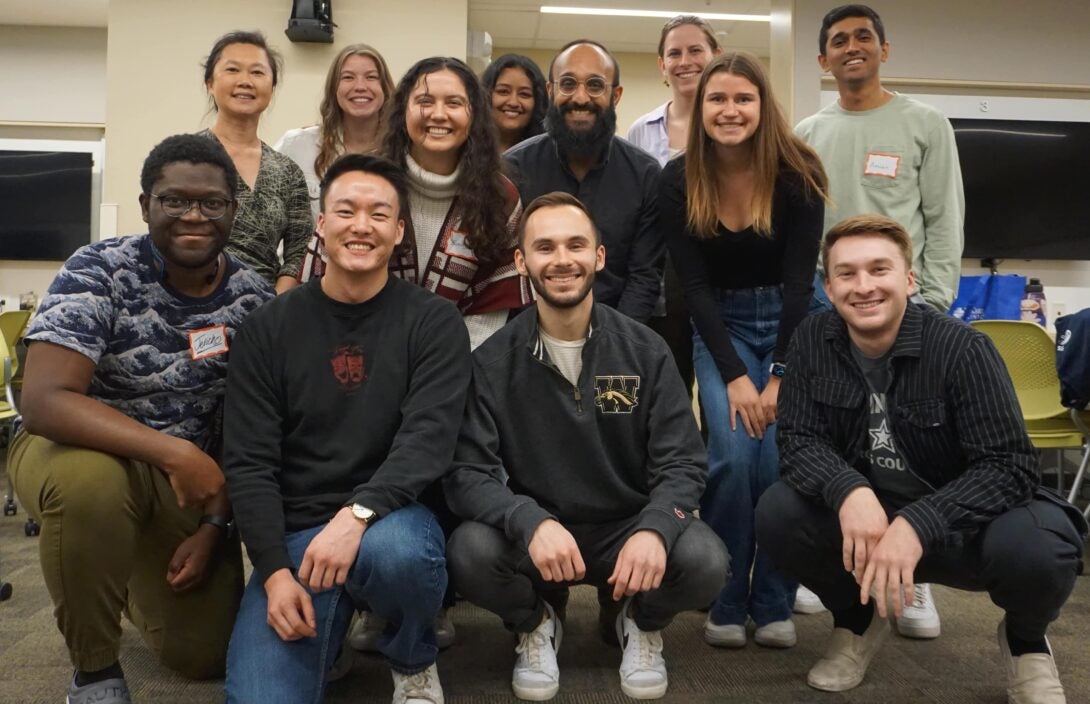Medical improv teaches students to listen and collaborate
Medical improv teaches students to listen and collaborate

Medical students will be forced to make decisions on the fly during their medical careers and when they do, they have to be prepared.
Students at the University of Illinois College of Medicine Rockford (UICOMR) participated in Making it Up As You Go: Using Improv to Enhance Communication, a workshop that utilizes improvisational theater to teach communication skills, with a focus on the medical field. In addition to having fun, students learn to make impromptu decisions, like what they will likely face in their medical careers.
“This workshop helps us enhance our education beyond the didactic normal education that we get in our lectures,” says Melissa Singleton, a UICOMR second-year medical student. “It helps expand our minds and keep that creativity in our lives.”
The workshop is also designed to help medical students become better observers and interpreters while building empathy and effective collaboration.
According to Chirag Rathod, PharmD, a clinical pharmacist supervisor at the University of Illinois Chicago College of Pharmacy, the exercises are hands-on and followed by a medicine-related debriefing discussion.
“The idea behind this is teaching clear, effective communication and adding it to their medical curriculum,” says Rathod, who co-facilitates the workshop with Linda F. Chang, PharmD, MPH, BCPS, associate professor of clinical family medicine. “We do improv exercises that have nothing to do with their medical studies, and afterward, we discuss what communication skills made them successful in an exercise and how they can transfer those skills into the medical world.”
Rathod started doing the two-hour workshop on the Chicago campus in 2018 before bringing it to Rockford. Kristi Kirschner, MD, a clinical professor in the University of Illinois College of Medicine Chicago Department of Medical Education, connected Rathod with Chang in order to bring the workshop to Rockford. Both Chang and Rathod took the same medical improv training.
“Dr. Kirschner knew we had mutual interest in using medical improv as a communication tool,” Rathod says. “Someone knew we were operating in the same space and I’d been talking about wanting to do improv and teach it.”
The workshop helps strengthen critical skills for students, including listening, observing, teamwork and spontaneity. Students should be able to recognize how improvisational theater skills can improve their ability to communicate effectively with patients and other members of their health care team.
“We really get wrapped up into what we are doing here and the 10 million things we need to memorize and the seriousness of each medical situation, so this activity lightened the mood,” Singleton says. “I knew everyone who was there, but this opened up a more personal relationship with them.”
Students who participated in the workshop did several improv skits. For example, students selected a fruit name, and they had to remember their fruit in a stressful situation. It’s an exercise called pattern toss, and the students were tasked with creating a pattern.
“If my word is mango, and the person after me is cantaloupe, they have to wait until I say mango before they can say cantaloupe,” Singleton says. “That’s basic, but then you start another circle with another word at the same time, so you have multiple words bouncing around a circle, so it forces you to pay attention to multiple things at the same time and you have to listen to the verbal and nonverbal cues. It helps you focus on multiple things at once, which is important in medicine, as well.”
It’s sort of like playing catch with two balls, Rathod says. The students have to follow each set of sequences.
“You need to be listening for someone who is going to speak to you and you need to make sure the person heard the message,” Rathod says. “We also talked about it in a medical context. What happens when we are not clear in our communication in the medical world? What if you are talking to another doctor or patient, but we don’t know if they’re listening?”
Another exercise they did was called time traveler. The group paired up and one person played the role of someone who was asleep for 300 years and another person was from today. The person from today had to explain a cell phone to someone who has been asleep for 300 years.
“The idea behind this exercise is speaking to someone with a different background than you,” Rathod says. “How do you understand their level of knowledge? How do you assess their level of listening? When you’re speaking to a patient, they don’t have the same level of knowledge and degree as you do, but you have to explain their diabetes or cancer diagnosis and do it in a way that they understand.”
The students come to the workshop equipped with most of the skills they’ll learn, but these exercises give students a chance to hone those skills in stressful situations.
“So much of their training is about being a physician and a healthcare professional, but there’s also the delivery of the information,” Rathod says. “Communication is a really important element of the job.”
Rathod says the hope going forward is the medical improv workshop expands to a larger, more integrated part of the curriculum, something the students say they’ll enjoy.
“I think some of the students want to continue it in some way,” Singleton says. “We can make interest groups, and we could expand it that way. I’d be interested in doing this again.”
The next workshop takes place on Friday, Oct. 18, 2024, at UIC Health Sciences Campus-Rockford. For more information, contact Chang at lchang@uic.edu.